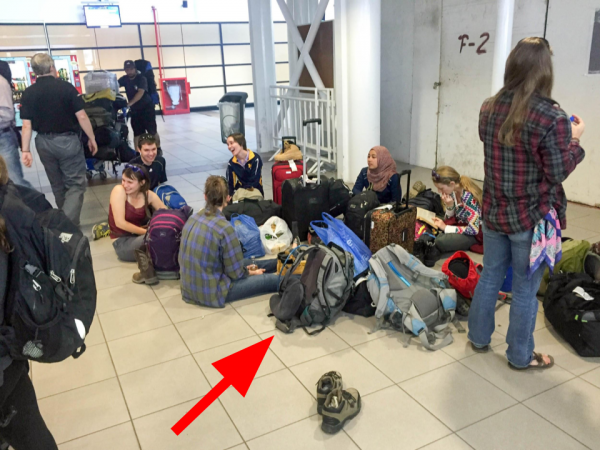
Don’t put all your eggs in one basket! Note the backpack among the circle of students at the airport. Soon after the photo was taken, someone walked through the group and replaced the backpack with a similar looking one stuffed with newspaper. The owner had a laptop and all backups—an external USB Time Machine drive and flash drives—together in that one backpack. (Peter Knoop)
The flight is booked, the reservations made. You’re about to embark on your research trip to another country, time zone, continent…maybe all of the above. Understandably, you’ve focused on the logistics, and now you’re focused on the research fun.
But, if you want to ensure a crisis-free experience, there’s another travel plan you need to make: the IT travel plan.
That’s what is offered as part of a series of workshops on campus called “Designing Your Research Trip.” The workshops are a collaboration of the University Library and LSA IT. Presenters on “IT Tips and Best Practices” include Peter Knoop and Joe Bauer, from LSA IT Advocacy and Research Support. University librarians Liangyu Fu, Janet Crayne, Barbara Alvarez, and Evyn Kropf offer tips for research practices.
The Library had done workshops on research travel previously, explained Knoop, but without the technology component. “I saw an announcement for such a session in 2016, so I reached out to them to see if they were talking about technology, and if not, offering to collaborate. They were not, so we developed it from there.”
The workshops, typically offered at Hatcher and Weiser Hall, offer direct links, phone numbers, websites and more, for making sure an IT disaster doesn’t derail your research adventure. A comprehensive IT travel plan also includes worst-case-IT-scenario prevention and response.
Presentations address backup software, such as CrashPlan, helpful U-M websites (e.g., Travel Safely With Technology), how to pack from an IT perspective (i.e., flash drives should be spread between luggage or people); using the UMICH Virtual Private Network (VPN) on all your devices, Eduroam secure Wi-Fi at partner institutions, and travel guidelines, including export controls on encryption software and international access to U-M Google, Box, and other resources.
Last but not least are apps to use when you need help, such as GeoBlue, for U-M’s international healthcare offering, and HERE WeGo for offline maps and routing.
Plans are to continue offering the workshop several times each winter term. The next workshop is scheduled for April 4, 3-4:30 at the Gallery Lab, 100 Hatcher Graduate Library.
